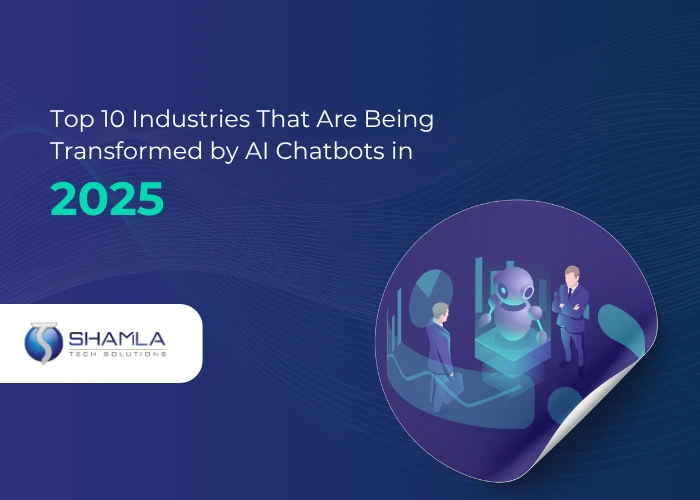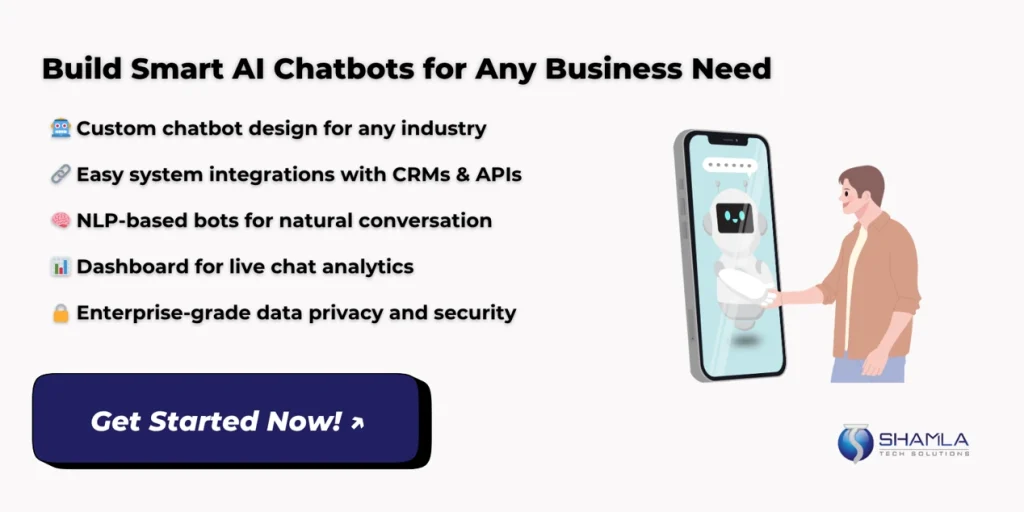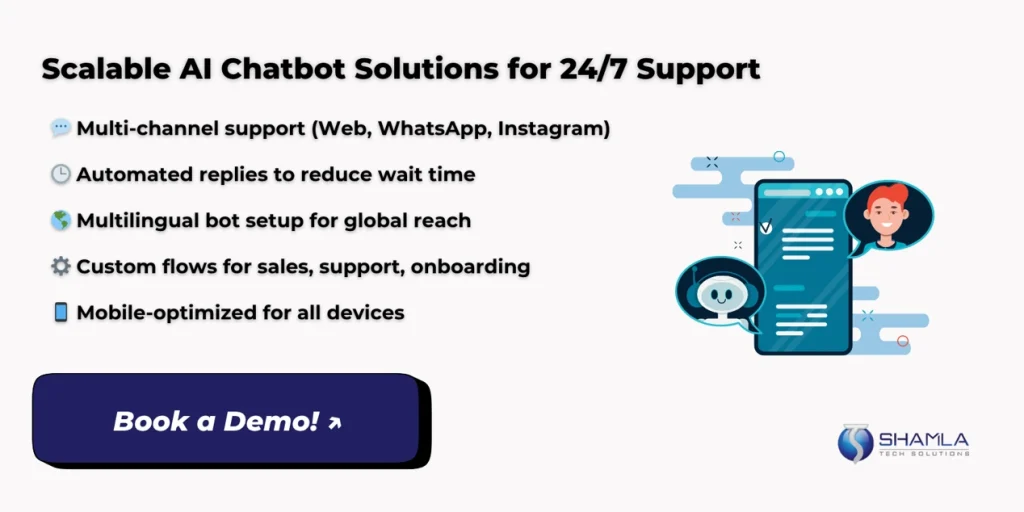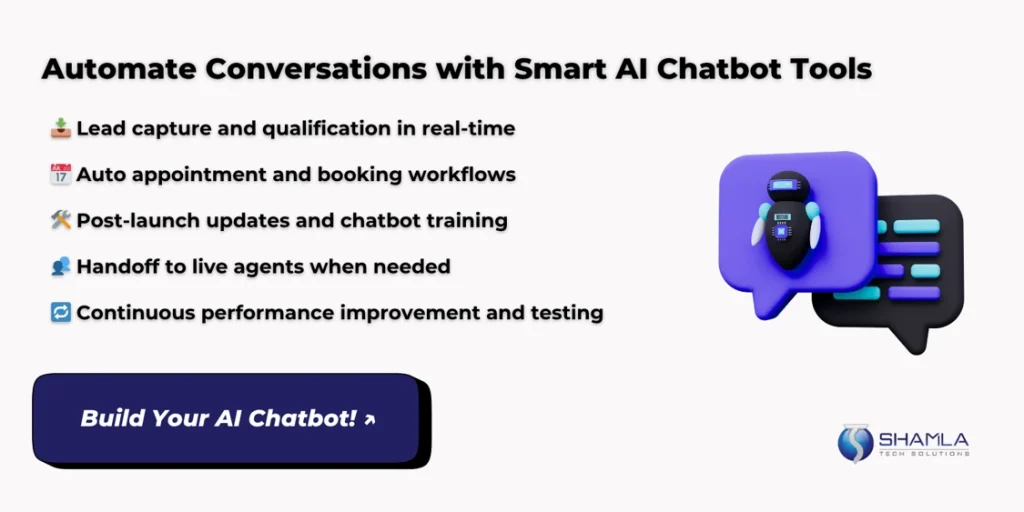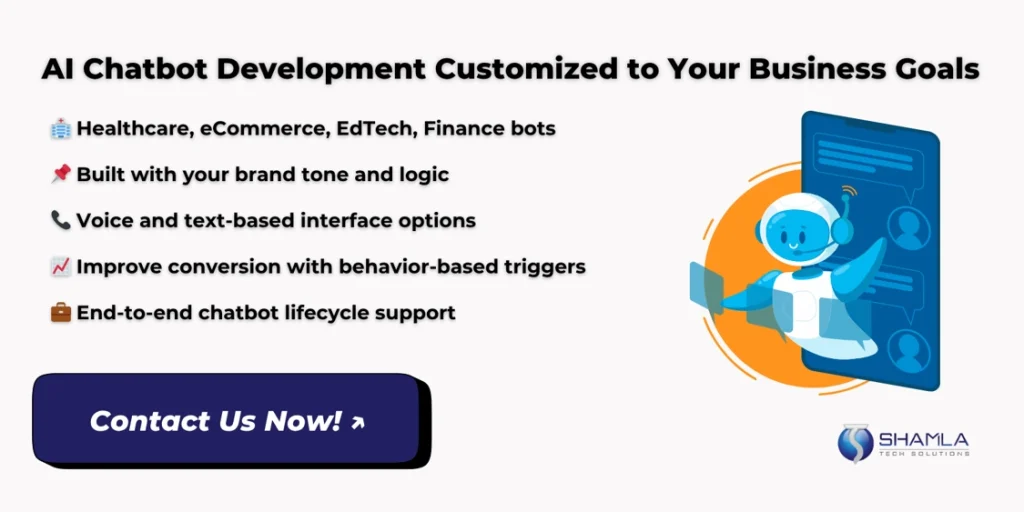AI chat tools have changed fast this year. In early 2025, companies began using bots to handle sales assistance, customer support, and data processing tasks. Trends show more stores, clinics, and banks use bots to cut costs and speed work. AI in healthcare drives patient chats, symptom checks, and lab result alerts.
AI chatbot for business boosts lead catch, order help, and meeting planning. In retail, bots guide shoppers and track stock. In finance, they clear questions and spot fraud. In education, they tutor and grade. In travel, bots share rates and book trips. In manufacturing, they monitor machines and schedule daily repairs.
10 Industries Being Transformed by AI Chatbots in 2025
1. Healthcare Sector
Chatbots sort patient needs by asking clear health questions and guide users to urgent care when needed. They book visits, send reminders, and offer mental health check‑ins that link users to real counselors. Symptom‑checkers walk people through common signs and suggest next steps. Rural clinics run these bots on slow networks to bring basic care to remote areas. AI in healthcare brings more help to more people without extra staff.
Chat systems link with electronic health records and video tools to access patient history and test results. This reduces paperwork for doctors, allowing them to focus more on patient care. Secure chat logs build trust and keep data safe. Babylon’s chat flows prompt check‑ups, while Ada Health maps symptoms to simple advice. These show an AI in healthcare can improve medical support.
2. eCommerce Industry
Online stores deploy bots as round‑the‑clock shopping guides that offer product suggestions based on past buys and browsing. When carts sit idle, bots send friendly prompts to finish orders. They field shipping, return, and payment questions in seconds to keep customers moving. This AI chatbot for ecommerce cuts lost sales and lifts repeat visits by making every step fast and clear.
Bots learn from each click and search term to customize deals, connect across website chat, mobile apps, and social media, and keep conversations in sync. This omnichannel flow raises click‑through and order rates. Platforms like Shopify and Amazon power their front ends with AI chatbot for ecommerce tools. Brands also use AI chatbot for customer service to resolve order snags instantly.
3. Education Sector
Study bots act like on‑demand tutors, breaking down lessons and tracking student progress. They set custom exercises when learners lag and share extra practice tips. Schools plug these guides into class portals so help is just a chat away. This AI chatbot for education makes lesson plans fit each student’s pace and needs.
Language‑practice bots let users chat to build vocabulary and speaking skill. Quiz bots test knowledge on the spot and give immediate feedback. They also point learners to the next course based on progress and goals. Coursera, edX, and Duolingo use these smart helpers. Using an AI chatbot for business in learning platforms streamlines account tasks and course sign‑ups behind the scenes.
4. Banking & Finance
Banking bots scan transactions in real time to spot odd patterns and alert users at once. They guide customers through ID checks by asking simple KYC questions and handling document uploads. Clients ask for balance updates, recent payments, or transfer status without waiting on hold. This AI chatbot for customer service runs nonstop to clear routine questions quickly.
Bots log every request and follow strict rules to cut mistakes in money moves. They learn from each chat to refine how they answer and reduce human slip‑ups. Banks embed these helpers in apps so users can freeze cards or report lost wallets in seconds. Bank of America’s Erica uses guided flows and smart replies to tackle account queries. This shows how an AI chatbot for business boosts finance support.
5. Travel & Hospitality
Chatbots handle booking support, itinerary changes, and local guides. They send airline delay alerts, rebook flights, and connect to hotel concierge bots. They serve travellers 24/7 with precise flight status, gate updates, and room service requests across time zones. Integrating an AI chatbot for business reduces call wait times and frees staff to focus on complex issues.
Bots offer multilingual support, switching languages instantly to assist global travellers at any hour. They use location data to share nearby dining, transport options, and weather updates. Secure payment flows let customers complete booking changes within chat. An AI chatbot for customer service pushes tailored discounts based on travel history. Companies like Expedia and Hilton show that AI chatbots speed up bookings and improve customer experience through fast replies, instant updates, and round-the-clock support.
6. Retail & FMCG
An AI chatbot for ecommerce guides in-store buyers through digital catalogs via QR codes or apps. Bots answer stock checks, map store layouts, and highlight related items. Loyalty features allow users to collect and use points directly through the chat interface. Feedback bots collect customer comments after purchase to refine product lines. Using an AI chatbot for business cuts queue times, boosts real-time tracking, and raises shopper satisfaction.
AI chatbots can also manage stock questions and send offer alerts through apps and in-store screens. They direct wholesale orders, check pricing tiers, and share delivery estimates for B2B clients. For B2C shoppers, chat flows offer size guides, sample requests, and next-sale notifications. An AI chatbot for ecommerce also links to payment portals for secure checkouts. Retailers like Sephora and Walmart deploy these systems to speed sales.
7. Education Technology (EdTech)
Adaptive learning bots create lessons based on performance, adjusting difficulty as students progress. They collect student and parent feedback through simple polls, logging responses for educators to review. AI chatbots give step-by-step help with scholarships and send college application reminders with clear deadlines. Gamified quizzes reward achievement badges to keep learners motivated. Institutions like BYJU’S and Khan Academy use an AI chatbot for education to personalize study paths.
Enrollment bots handle course signup and answer fee questions instantly, matching student needs to available programs. They monitor schedules and send plan updates to prevent missed deadlines. Support bots also answer technical issues and platform navigation queries, acting like a mini help desk. This AI chatbot for customer service handles questions faster. Using an AI chatbot for education in learning tools increases student sign-ups and lowers the need for manual support.
8. Insurance Industry
9. Human Resources (HR) & Recruitment
Recruitment AI chatbots parse resumes, rating candidates on key skills and flagging top matches for hiring teams. They schedule interviews by syncing calendars, sending confirmations, and handling reschedule requests without manual back‑and‑forth. Onboarding assistants guide new hires through paperwork, training modules, and policy overviews. Using an AI chatbot for business reduces recruiter workload and speeds talent placement. Internal bots also field HR FAQs to keep productivity high.
HR chat systems answer policy and benefits questions on demand, logging queries for compliance tracking. They help managers run team surveys and collect anonymous feedback. Productivity bots automate leave requests and expense reports with clear approval paths. An AI chatbot for business integrates with HRIS platforms for seamless data flow. Tools like Paradox Olivia and Eightfold.ai exemplify these workflows in large organisations.
10. Real Estate
Conclusion
Chatbots now power every sector, from clinics to stores and banks. In 2025, they drive fast help, self‑service, and smart data use. Companies adopting AI chatbot for business operations and AI chatbots for customer service see slimmer teams and happier clients.
Shamla Tech is a leading AI chatbot development company that has built chatbots for businesses that cut reply times by 60%, lift lead capture by 40%, and automate tasks on platforms. Our bots handle thousands of queries daily, integrate with CRMs and payment gateways, and scale from dozens to millions of users. We measure success in faster actions and clear ROI.
Ready to transform your business with AI Chatbots?
Contact us today to Build your own AI Chatbot customized for your business needs!
FAQs
1. What benefits do AI chatbots bring to businesses?
2. How do chatbots integrate with existing business systems?
3. What industries benefit most from AI chatbots?
4. How do businesses measure AI chatbot success?
5. What are common challenges deploying AI chatbots?
Challenges include data privacy, handling complex queries, maintaining context, training on domain‑specific language, integration with legacy systems, ensuring uptime, avoiding biased responses, monitoring performance, continuous updates, and user adoption hurdles.

